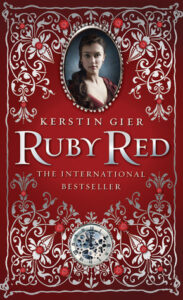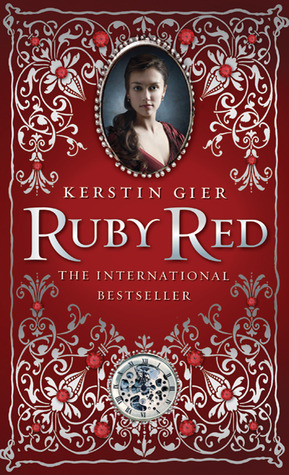
While high-fantasy and dark fantasy are my favorite sub-sections of fantasy, I can appreciate a good urban fantasy novel when I manage to get my hands on it, and that’s what I wish would’ve happened when I read “Ruby Red” by Kerstin Gier for this week’s book review.
All her life, 16-year-old Gwen Shepherd has come in second place to her cousin, Charlotte, just because Charlotte was predicated to develop the family’s time-traveling gene over Gwen. Watching movies and spending time with her BFF Lesley, Gwen is ill-prepared for the realities of time-travel when she suddenly appears in industrial-era London in her 21st-century school uniform.
Gwen, after telling her mom about her adventures, is thrown into a secret society whose mission isn’t what it seems. Trying to figure out one side of the story from another, she also must navigate her developing feelings for Gideon, her handsome companion who she feels she’s met before. Time-traveling has never been so complicated.
This novel had potential. It really did. Although Gwen lacks the training for spontaneous time-travel, she makes up for it in her passionate and critical analysis of anything she encounters. She jumps into battle with a sword she can’t wield to save Gideon. She wants to hear the other side of the story from her ex-society member cousin instead of just blindly believing what the society wants her to do. After being warned about the creepy, old founder of the society by her mother, she becomes wary of his behavior while everyone wants to sit down and have a cup of tea with him.
Gwen’s character is one of the few redeemable things about this novel (alongside Lesley, who has a movie suggestion for every problem the girls come across, “Back to the Future” being one of them), and Gier pushes the reader to sympathize with Gwen. Imagine if you were randomly poofed into a different time period with no education on the matter. No idea if you’d come back. No family. No money. I’d die.
But this is where I hop off the train of good things and onto the train of things that aren’t so good.
What went wrong with this novel is this: there wasn’t a real conflict besides Gwen discovering she can time-travel and the fact that someone was trying to kill her and Gideon. We never find out who is behind the murder attempts, and that is something that needs to be addressed. The villain needs to be revealed even if he/she/they escape(s) in the end. A larger conflict needs to be revealed, which will be extended into a sequel. But none of those things happen. This novel feels like a beginning that isn’t perfected or ended.
Speaking of beginnings, the third time Gwen travels back in time without guidance, she stumbles upon a scene of her future self macking on Gideon. And I’m thinking, “They’ll explain that later on, or we’ll get a bigger version of that scene later on.” An explanation doesn’t come. A scene doesn’t come. One of the most prominent rules of writing is if you mention it in chapter two, it will come up towards the end of the piece of work. Obviously, Gier either chose to ignore that rule, or she didn’t learn enough about the craft before setting out to write this novel.
And don’t even get me started on Gwen and Gideon’s relationship. There’s clearly something going on between them, but the audience nor the main freaking character are clued into it. Gideon, on several occasions, calls her “Winnie.” At the very end of the novel when they’ve known each other for about three days, he says she’s the most special person in his life. NO. GIER WE NEED LEAD UP. MAKE IT MAKE SENSE.
Make it make sense is my whole suggestions for this novel, and sadly, it didn’t. Gier left out too much in “Ruby Red” for me to enjoy it.







